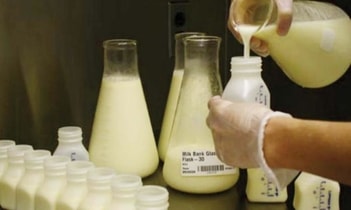Is Your Dairy Toxic?
Dairy products are one of the most common foods consumed around the world. Some cultures survive on diets consisting of up to 80% raw cow, goat, &/or sheep milk. In the western world, however, dairy has become one of the most inflammatory foods. A recent discovery shows that a genetic shift in the casein molecule has produced a powerful toxin linked to numerous disorders and diseases.
Milk contains two primary protein molecules: whey and casein. Casein makes up about 80% of the protein in the milk. Casein is made up of 209 amino acids strung together in sequence. The 2 primary forms of casein are: A1 Beta Casein and A2 Beta Casein. These 2 are nearly identical in structure except for the amino acid at position 67. A1 contains histidine while A2 contains proline.

The bond between histidine and its linked amino acids is much weaker and much more easily broken than the bonding of proline in A2. This splitting happens during the digestive process and creates a peptide called beta casomorphin 7 (BCM7). BCM7 is an opioid which gives it morphine-like qualities. This creates rampant oxidative stress in the gut and blood stream. BCM7 is a 7 amino acid peptide that is resistant to degradation. It takes very strong immune responses to break this molecule down effectively. This immune response often takes place in the gut and causes digestive distress and leaky gut syndrome. The most susceptible individuals are those who already have digestive problems and infants who naturally have increased intestinal permeability. When BCM7 passes into the bloodstream it is able to cross through the blood brain barrier. In the brain, it can bind to opioid receptors and causes symptoms of schizophrenia, autism, and other mood and neurodevelopmental issues. Research performed on rats has shown autistic and schizophrenic type behavioral changes after the rats were injected with BCM7. A1 beta casein and its byproduct BCM7 have also been linked to cases of type I diabetes, digestive disorders, neurodegenerative disorders and heart disease. These issues have the most supportive evidence linking them to A1 beta casein. This does not mean that A1 beta casein isn’t associated with other health disorders as well. It can be quite challenging to enjoy dairy products and avoid A1 Beta Casein in the western hemisphere. You certainly have to look for specific breeds of cow that will not be labeled at the grocery store. A1 beta casein is produced by cattle belonging to the Bos Taurus subspecies which is the primary breed of cattle in the western hemisphere. The Guernsey breeds produce only about 10% of their beta casein as A1 while the Jersey breed produces about 35%. The Ayrshire, Holstein and Fresian breeds tend to produce 50% or more. To sum up, quality can be compromised for quantity. We have to be extra careful for what we consume as our food.
Shop Apni delivers pure A2 milk of indigenous cows to it’s customers in Chandigarh, Panchkula, Mohali, Zirakpur and Agra(UP). A2 Milk “As Good as Mother’s Milk”






